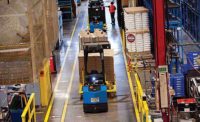Appliance Maker Implements Speech Recognition Software on the Assembly Line




The pace at which artificial intelligence (AI) is becoming a mainstream technology in manufacturing is quite impressive. Companies in many industries use AI daily to optimize assembly processes, perform predictive maintenance, improve part and product quality through enhanced vision inspection, and increase data cybersecurity.
Appliance manufacturer BSH Hausgeräte GmbH hopes to soon expand this list of achievements. Innovators in the company’s Startup Kitchen division recently partnered with Fluent.ai Inc. to bring speech-to-intent AI to assembly lines at BSH’s Traunreut, Bavaria, factory. The goal is to improve worker efficiency and ergonomics as they produce standard ovens, compact ovens with integrated microwave, and radiant cooktops.
“After considering 11 companies for this partnership, we chose Fluent.ai because its offline technology offers robust noise controls and low latency,” says Ion Hauer, venture partner at BSH Startup Kitchen. “This means the software is able to quickly and accurately understand voice commands even in a noisy factory environment. The company also provides multilingual and multi-accent support, which is key for [our] global reach in more than 50 countries.”
Based in Montreal, Fluent.ai is a speech recognition software company looking to voice-enable all of the world’s devices—thereby allowing everyone to be understood by their technology. It has developed several customizable AI voice-interface products for OEMs and service providers over the past seven years.
Unlike popular voice-user interfaces in devices like Siri, Google Home and Amazon Alexa, Fluent takes speech recognition off the cloud, embeds it on small footprint platforms, and uses low-power interfaces led by not-always-connected devices.
For BSH, Fluent.ai created a voice-recognition system that lets heavy machine operators at each workstation speak a Wakeword followed by a command into a headset. The word and command trigger the appropriate movement of an appliance on the assembly line.
Previously, an operator pressed a button at his workstation to move an appliance along the line to the next station. This movement took up to four seconds between work areas.
Because the AI-based technology is hands-free, Hauer says that workers experience less fatigue and are much more productive. He points out that early results show worker efficiency has increased an average of 75 to 100 percent.
“Implementing [this] technology has cut the [appliance transference] time from four seconds to one and a half,” says Markus Maier, project lead at Traunreut. “In the long run, the production time savings will be invaluable. We started [using the voice-recognition system] on one factory assembly line, then [increased it to] three, and [are now] considering rolling out the technology worldwide.”
BSH is the largest manufacturer of home appliances in Europe and one of the leading companies in the sector worldwide. The company’s well-known brands include Bosch, Siemens, Gaggenau, NEFF, Thermador, Home Connect and Kitchen Stories. Products are assembled at 38 factories in 50 countries. Last year, BSH had 60,000 employees worldwide and posted sales of 13.9 billion euros.
Fluent.ai is working with manufacturers in other industries to implement its voice-recognition system. These include CEVA Inc. (licensor of wireless connectivity and smart sensing technologies), Ambiq Micro (energy-efficient semiconductor designer) and COMMAX (smart home control and security devices).
To learn more, call 800-729-2184 or visit https://fluent.ai/.
Looking for a reprint of this article?
From high-res PDFs to custom plaques, order your copy today!






.jpg?height=200&t=1743848480&width=200)

